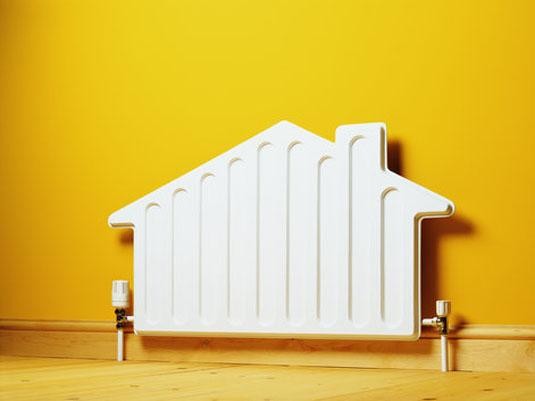If you have any need for heating the new premises, or you decided to find an alternative to the old heating system, we advise you to approach this issue thoroughly and seriously. Today, there are quite a lot of fuels, each has its advantages and disadvantages in application. When it comes to the design of the heating system, the choice of equipment and type of fuel use primarily key factors
- availability of raw material base, it is not profitable to buy cheaper fuel, which is in the distance to your home or production, otherwise all the savings will be spent on transportation;•
- fuel price – currently, this factor is the most decisive for our user;•
- usability of a particular fuel – decide for yourself whether you are ready for physical work and additional maintenance of the heating system, or agree on a comfortable heating?
We decided to put basic information about the most common types of fuel and their heating properties.
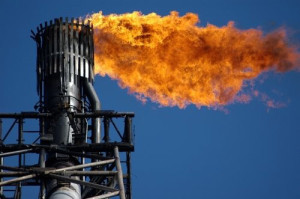 The most popular type of heating
The most popular type of heating
is gas heating
Advantages:
- The gas supply level for domestic and industrial use is quite high, practically everywhere you have access to gas utilities. This explains the popularity of gas as a primary fuel.
- Gas burning provides relatively high coefficient of thermal efficiency up to 85%;
- The gas supply is conducted non-stop uninterrupted;
- Gas boilers work via automatic control units, so the maintenance is limited to checking procedure and fitting once a year;
Disadvantages:
- Price. The cost of gasfor population and enterprises is constantly increasing. In the end, it is very difficult to plan your expenses for the heating season.
- Despite the gas boilers cheapness, the connection to gas supply system and all permits will cost you quite expensive.
- The boiler setting and maintenance is carried out only by certified organizations.
- In spite of the extensive gasification of settlements in Ukraine, you can face the fact you will have to pull the gas pipe to the village, where your country house stands. Alone, it is difficult, mainly from the financial side. Our advice is to cooperate with other villagers and decide the gasification issue by joint efforts.
- Poor quality of the gas, as well as unstable pressure in the system leads to a heating equipment failure.
The use of electricity as a heating 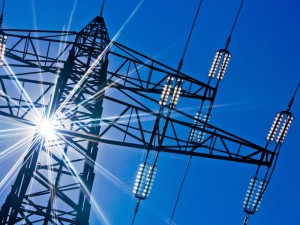
source also has its pros and cons.
Advantages:
- Environmentally friendly – electric heating does not cause combustion emissionsto air and waste.
- Availability. Ukraine produces sufficient quantities of electricity for its own consumption. You don’t even have to waste time searching for a power source – electricity itself is coming into your home.
- Small size electrical equipment, saving space.
- Easy maintenance of the boiler. Moreover, you can adjust the output temperature.
- Relatively cheap equipment.
- Electric boilers have the highest efficiency of 99%.
Disadvantages:
- Electricity is the most expensive heat source. And by using electricity as a heat source on a commercial scale, the company will go bust for sure.
- The electrical heating requires a large number of permits and documentation.
- Due to the frequent planned and unplanned outages, heating will be accompanied by interruptions. Electric boilers are volatile, in this case, you should take care about an alternative energy source – solid fuel boiler or generator.
- The limited capacity of the electricity distribution networks. Boilers up to 6 kW (they may heat the room to 60 m2) can operate on a single phase. For boilers of more than 6 kW required 3-phase equipment.
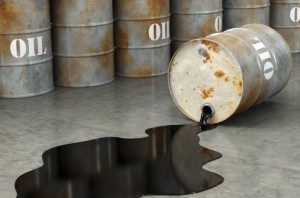 Liquid fuel (mazut, diesel fuel)
Liquid fuel (mazut, diesel fuel)
Advantages:
- Oil-fired boiler requires no special permissions to install.
- Almost all heating equipment that runs on liquid fuel, equipped with automatic controls – this guarantees you ease of use.
- Oil boilers are very easily converted to other fuel. So, simply installing a gas burner, you will switch the heating equipment to gas.
- Burning liquid fuel has a high coefficient of performance. In case of high-quality burners and liquid fuel efficiency can reach 95%.
- All combustion products comply with environmental standards. As a result, environmental pollution is minimal.
Disadvantages:
- The main drawback of such heating system is imposing costs on fuel. Besides, the price for oil products is constantly jumping. And considering the irreplacability of oil reserves, the trend of depreciation in the future is not expected.
- Oil boilers should be placed in a specially equipped room, with large floor space. The boiler room must be warm – otherwise, the liquid fuel can gel and clog filters.
- Combustion of liquid fuels emits smoke, so take care of good ventilation in the boiler room. Another specificity of liquid-fuel boiler is noise. Just keep in mind the necessity of sound insulation.
- Purchase, transportation and storage of liquid fuels require special tools, containers, premises.
- In fact mazut or diesel fuel will bring you the bad smell and dirt. In addition, the leakage and spillage of fuel increase the risk of ignition.
- The work of liquid fuel boiler is directly dependent on electricity. In case of energy failures you will have to overclock the boiler manually.
Different ranks of coal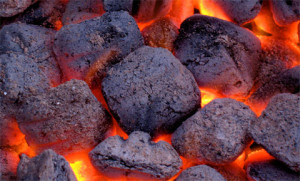
Advantages of coal heating:
- High calorific value of the coal and ability to retain heat for a long time.
- Relatively low cost of heating.
- Coal is accessible fuel in any rank and size.
- Easy in storage – coal can be stored outside the room under a canopy.
- In conjunction with coal boilers can burn household garbage.
Disadvantages:
- To maintain the heat you need to regularly throw on coals (2-3 times a day).
- Coal has high ash content (up to 35%), so you have to remove it from the boiler (once every two days) and clean the chimney.
- The ash which remains after burning coal is very carcinogenic, hazardous and requires disposal. For its removal you need freight transport and thedisposal permit.
- By burning coal emits adverse dangerous gases which are very difficult to define without specific sensors of gas contamination.
- Unpleasant smell of the burning coal in the area is also not for everybody.
- Burning coal is not very environmentally friendly. High level of CO2 – your contribution to greenhouse gases.
- Ukrainian coal is not always high quality, noncombustibleresiduein some ranks of coal may reach 30%. As a result, you obtain a low calorific value, additional equipment cleaning and more waste for recycling.
- Coal is a very dirty fuel. Coal dust pollutes the room and is inhaled by human. To people with chronicrespiratory illness the coal heating is extremely contraindicated.
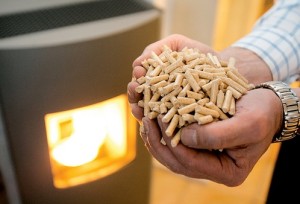 Pellet heating
Pellet heating
This type of fuel has recently entered the market of Ukraine but already proved itself from the best side.
Advantages:
- Solid fuel boilers, as a rule, allow to fully automate the process of fuel supply and burner cleaning.
- Effective management – ability to adjust the temperature.
- Environmentally friendly – by combustion of pellets is released as much CO2 as from a street fire.
- Pellets have low ash content (0.5%), unlike coal. In addition, ash is environmentally friendly, has many micro – and macronutrients and can be used as an excellent fertilizer.
- When burning pellets, the efficiency can reach 95-98% (depending on the raw material).
- By switching your boiler on a continuous burning you can load fuel only twice a day, which brings you the ease of maintenance and additional fuel savings;
- Depending on capacity of heating equipment pellets can be used to heat large areas up to 3000 m2.
- Pellets take up little space for storage, do not carry a lot of dirt and poorly susceptible to spontaneous combustion.
- Since fuel pellets are usually made from wood and agricultural waste the raw materials will always be available.
Disadvantages:
- You need to contain a storage room for fuel.·
- Large size of the heating equipment would require a separate room.·
- From time to time you will still have to clean the pipe and furnace from the combustion products.

